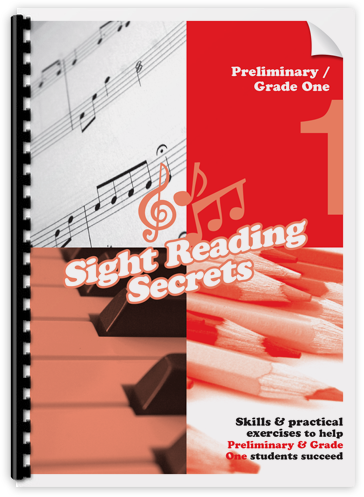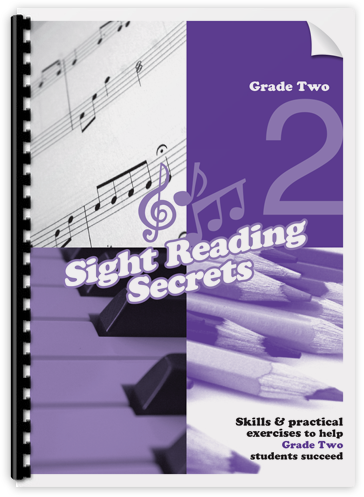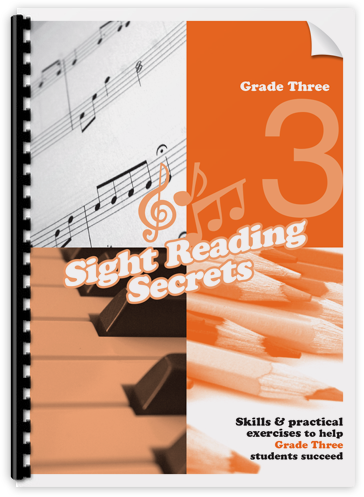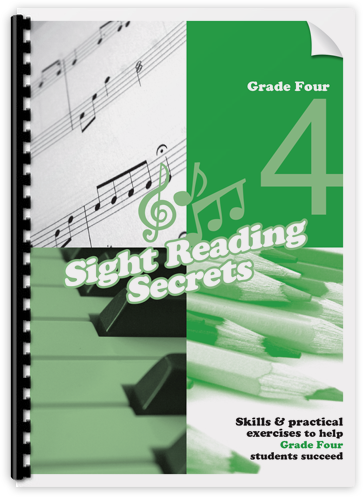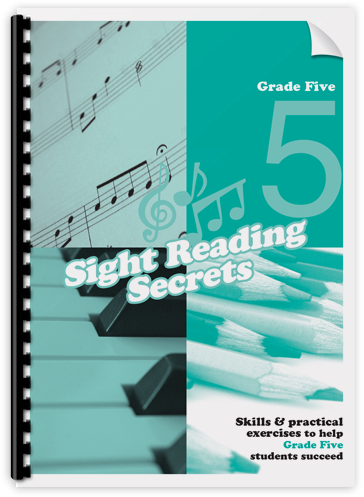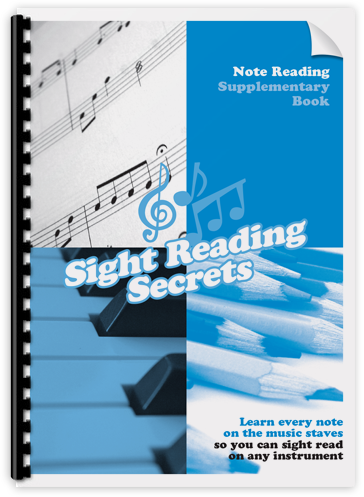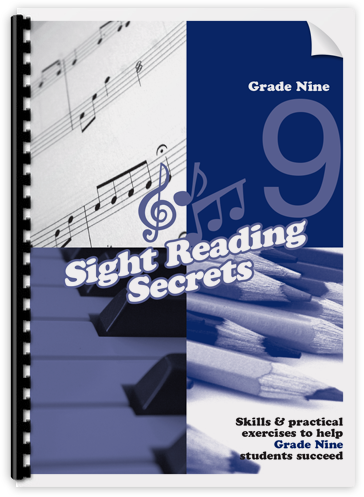Warning: Ignoring This Skill Could Destroy Your Child’s Confidence
For months, your child has worked towards this day. She has slaved over her scales, worked tirelessly at her pieces and improved her general musical knowledge. You have driven her to lessons every week, and reminded her to do her practice before dinner.
As she comes out of the exam room she holds back the tears as she admits the sight reading was very hard.
But as you wait in the corridor outside the exam room, you hear her stumbling over a new piece of music. It sounds a bit wobbly, with wrong notes and hesitations. As she comes out of the exam room she holds back the tears as she admits the sight reading was very hard. Despite all her successes in the exam, she is unhappy. Of course, the few wrong notes stick in her mind, and she worries about her exam result. And for the next few weeks, you wait.
Ignoring Sight Reading Can Turn an A into a B
Looking over the exam report a few weeks later, you read the examiner’s glowing comments about the things your daughter worked so hard to prepare: the pieces, the scales, the general knowledge. “Well prepared” reads the report. “Expressive tone.” “Confidently performed from memory.” However, for sight reading the comment is “needs much work.” In part of his summary, the examiner writes: “Your sight reading let you down today and cost you a grade.” Fighting back the tears, your daughter turns away. She is bitterly disappointed, because her teacher had assured her that she deserved an A.
All that hard work and the expected reward did not materialise.
Although a B is a great result, your child dwells on it as if it was a failure. All that hard work and the expected reward did not materialise. For two weeks, she barely touches the piano. The new pieces her teacher performs with enthusiasm don’t appeal to your daughter. Burned out, she loses motivation. The lesson she has learned is this: you can still fail even though you work hard. It’s not worth working hard if you will only fail in the end. You might as well not even try.
Is this the kind of lesson that you want to teach your children? Is it worth taking the risk?
Don’t Learn Sight Reading In The Exam
What she should know is that the failure was not hers; it was a failure of preparation. It was nothing to do with her musicality, her desire. It was because she had only tried one or two sight reading pieces this year, so she had never had a chance to master the skills. She had prepared her pieces, scales and general knowledge day after day but she hadn’t ever really prepared for her sight reading.
...the sight reading component of an AMEB music exam is a significant part of the total marks given.
Because reading music is an essential skill, the sight reading component of an AMEB music exam is a significant part of the total marks given. However, it is often neglected in the weekly lessons and ignored in daily practice. Some parents are surprised after their child’s first exam to hear there was a sight reading component, because they only heard their child practicing pieces and scales- the things in their books.
Sight Reading Secrets Is Designed To Build Your Child’s Confidence
For several years I sat behind an administration desk during exam weeks. Nervous children (accompanied by nervous parents) checked in for their exam, and I tried to be reassuring and calming. “I’m sure your teacher has helped you prepare really well,” I would say. Parents would check a few last minute things with me if their teacher wasn’t there. “Was my son supposed to bring his scales book? What does maestoso mean?” To be honest, I think parents can be more unsettled than the students! (My own mother would attest to that!) But parents just want to know they have done everything they can to help their child prepare.
This is why I wrote Sight Reading Secrets. Watching a nervous child waiting in the hallway before an exam is easy compared with seeing them rush out at the end fighting back tears, or refusing to look at their parent, or just repeating “I stuffed up!” Between them, my students have made it through more than one hundred AMEB piano exams, and I quickly learned how a seemingly well-prepared and conscientious student can be rattled by feelings of inadequacy in an exam, or by a disappointing result.
Sight Reading Secrets is designed to ensure your child is prepared and confident in the sight reading component of an AMEB piano exam. There were very few sight reading resources which covered this essential skill in a way that a student could embrace. Students need more than two pages of examples for a whole year’s worth of effective preparation. Students also need current Australian resources that relate directly to AMEB exams, not those held in USA or the UK.
Good sight reading preparation can often be the final step that ensures a good exam result.
- High marks will build a sense of confidence and achievement for your child.
- Their self-esteem will be lifted.
- They will know that they have overcome obstacles to attain their goals.
- They’ll learn from a young age that even if a challenge appears too hard they’ll be able to conquer it by working steadily and preparing correctly.
- They’ll learn that there is a reward for consistent practice and that achievement can be celebrated.
- They’ll be motivated to continue on.
The easy lessons of Sight Reading Secrets will build their confidence in working independently over time.
They’ll learn from a young age that even if a challenge appears too hard they’ll be able to conquer it by working steadily and preparing correctly.
When they approach their exam they will feel confident. They will have been working hard on all aspects of the exam and will be familiar with all the skills and disciplines that they’ll need. There will be no nasty surprises at the sight reading part of the exam which could potentially shake their confidence.
So instead of coming out of the exam upset, your child will come bouncing out with a grin. She’ll be relieved that the experience is over and really excited by the fact she was well prepared for all aspects of the exam. Throughout the exam she felt like she was ready to be there.
During the next couple of weeks, your child’s confidence is sky high. A letter comes home from school inviting you to an assembly where your child is being recognised for their enthusiasm and care for their fellow students. When the marks finally arrive from the music exam, they are great. Everything that she worked so hard on was recognized and rewarded. There were a few small areas to work on, but these are motivating her to keep working, not to be discouraged.
Allows Your Child To Master Sight Reading
Sight Reading Secrets enables your child to practice the essential skill of sight reading by creating opportunities for tangible, achievable and regular practice. This is important in mastery of any skill. Even though they say you never forget how to ride a bike, if you get on a bike after several years you’ll find that your skill to get through traffic or ride up hills is not as good as you remember it.
Through regular practice, sight reading -just like any other skill- will be learned more quickly and mastered thoroughly. Sight Reading Secrets makes sure that sight reading doesn’t become an afterthought in your child’s exam preparation but is instead worked on regularly like every other part of the exam.
Allows Child To Steadily Build Confidence
SRS allows your child to start at a level at which they feel comfortable and build up from there. In most cases students can play more proficiently than they can sight read, and for some this means their reading skills are a few levels lower than they need to be. Rather than your child feeling overwhelmed by the sight reading level expected for their grade, they can have confidence to start out on the journey of sight reading progress by beginning where they feel comfortable. As they progress their skill will increase, and so will their confidence. They will learn that no matter how hard something seems, they will be able to overcome it in small steps.
Keep Sight Reading Fresh
SRS was written to give students enough resources so they could practice sight reading for a whole year without getting bored. While looking around for resources for my own students to practice sight reading, I found that many out there only had a couple of pages for each exam grade. By the time students have practiced the same two pages a few times, they have learned the pieces, and are therefore no longer practicing their sight reading ability.
By providing enough material for a child to practice through the entire year, SRS makes sure that when it comes time to do the exam the necessary skills have been thoroughly practiced and are fresh and front-of-mind.
Build Skills Needed For Exam
The actual music exam is not the place to try and learn sight reading. This will only lead to frustration and damage to your child’s confidence.
SRS makes sure that every skill needed for the sight reading component of the music exam has been introduced and thoroughly practiced.
When the examiner asks your child to play a piece by sight in the exam they will be confident and do it easily.
An Extra Lesson Every Week
SRS will allow your child to practice sight reading five minutes a day, six days a week. This extra thirty minutes a week is like a whole private lesson dedicated to improving your child’s sight reading.
SRS will also increase the benefit you get from your music lessons. It will allow your teacher to gauge your child’s sight reading skill and progress quickly. By moving the majority of learning and practice to outside your lesson times, your teacher can spend just a few minutes of the lesson quickly identifying and targeting weaknesses. More time in each lesson can be dedicated to polishing repertoire, improving technique, deepening musicality and developing musical understanding.
...a great music exam mark can open doors to scholarships and other opportunities for your child’s education.
When you consider the time investment of your child and yourself in practicing and going to lessons and exams, as well as the cost of private lessons and music books, then the price of the SRS book is insignificant. Keep in mind, it could mean the difference between a good mark and a great mark. Consider also that a great music exam mark can open doors to scholarships and other opportunities for your child’s education.
Guarantee
By itself SRS cannot guarantee high marks in a AMEB music exam. There are many other factors involved. Your child will still need to practice and work hard on the other skills that make up the exam.
If you don’t feel like it has helped I will refund your money within a year of purchase... and you can keep the book.
However I am confident that if your child uses SRS as part of a regular practice plan they will master the sight reading skills of the exam. I’ve seen it happen enough times with my own students and those of my fellow teachers.
I’m so confident that if your child practices regularly with SRS over the course of a year and you don’t feel like it has helped them at all with their sight reading during the exam, I will refund your money within a year of purchase... and you can keep the book.
Conclusion
Most of my students (and those of other teachers that use the book) buy SRS for every grade exam they take because it has worked for them year after year. It helps them prepare for a significant part of their exam and gives them the confidence for great exam performances.
The worse thing you can do for your child’s confidence is send them into a high-pressure exam situation if they are not fully prepared. You risk destroying your child’s confidence and future motivation.
It builds confidence for your child and reinforces lessons that will hold them in great stead through their whole life. Any obstacle can be overcome with focused and regular effort. Things that were once hard become easy if you work at them. Thorough preparation can help them achieve anything.
SRS aims to help in its own small way.

